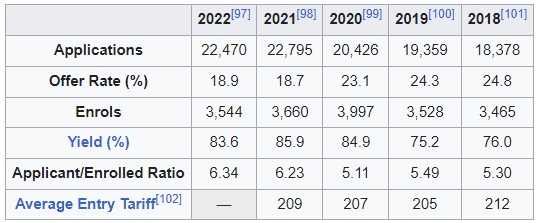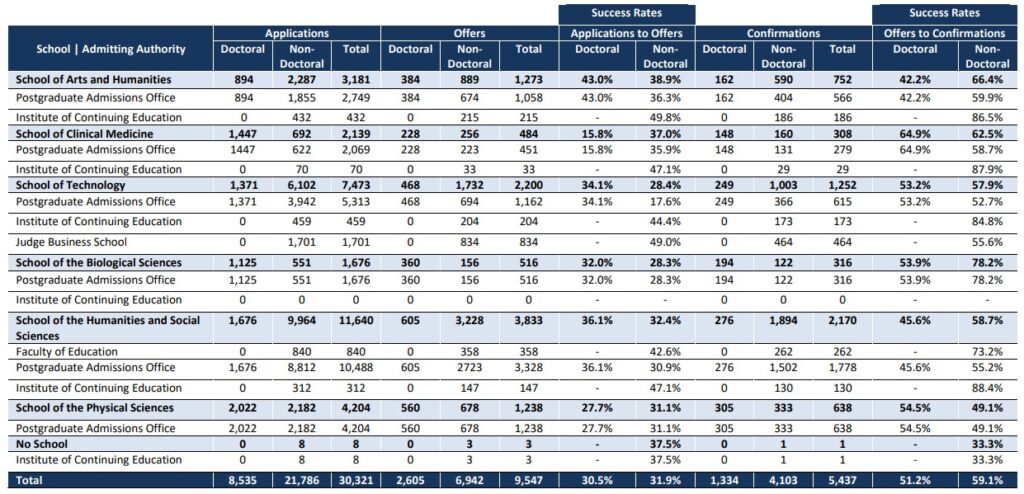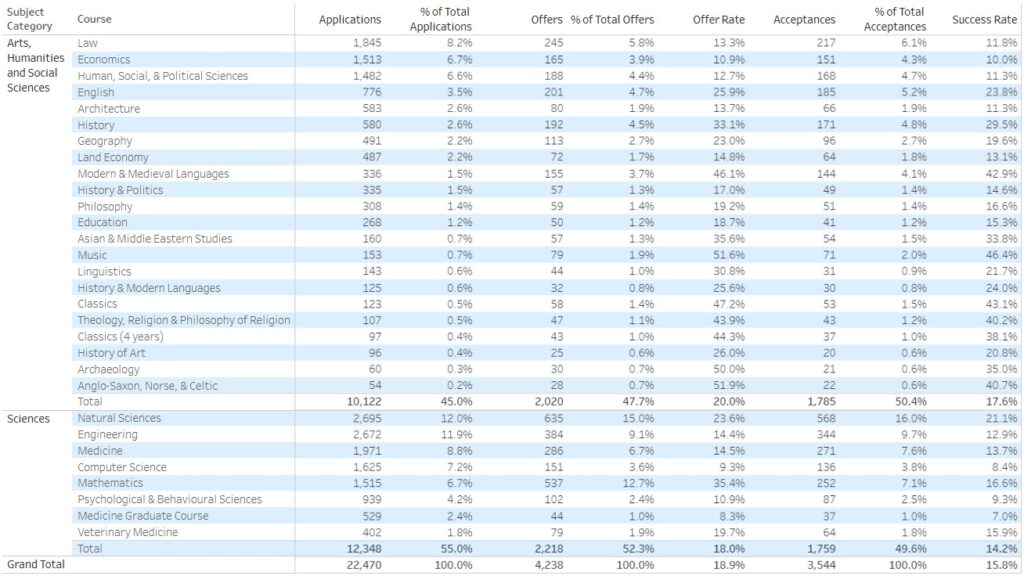Are you dreaming to study at Cambridge University? But don’t know where to start? Don’t worry at all! In this blog post, we will cover everything… Cambridge University acceptance rate, fees, admission requirements and many more…
In our thorough guide, we’ll go over all you need to know about attending the world-renowned University of Cambridge. We will also go through everything from beginning to end, including Cambridge’s extensive history, academic offerings, the entire admissions process, tuition fees, financial aid options, campus life etc.
Whether you pursue undergraduate or graduate courses, this post will offer insightful information and helpful advice on studying at Cambridge University. So, without further ado, let’s get started…
Cambridge University acceptance rate, fees & requirements
Above all, Cambridge University acceptance rate, fees & requirements really depends on so many things. This University is famous for its academic excellence and long history. But the acceptance rate is low, admitting only a small percentage of applicants. Therefore, to get accepted, students need exceptional academic achievements, excellent test scores, and strong recommendation letters. Additionally, candidates go through rigorous interviews to assess their suitability for the program. The fees can be relatively high, but there are scholarships and financial aid options available. Despite the challenges, many students dream of studying at Cambridge due to its outstanding education and global reputation.
Cambridge University: An overview
ln fact, Cambridge University is located in the center of England’s historic city of Cambridge. And it is the second-oldest university in all English-speaking countries and the fourth-oldest university in the world.
The University of Cambridge has more than 20,000 students from 140 countries. There are 31 Colleges, six Schools and over 150 Faculties and Departments that make up the University of Cambridge, covering various subjects and specialized research areas.
According to the 2023 QS World University Rankings, the university is ranked second in the world. Moreover, being established in 1209, it has a rich history spanning over eight centuries, symbolizing academic excellence and intellectual pursuit. With such a distinguished heritage, Cambridge University continues to be a beacon of knowledge and innovation, attracting students and scholars from across the globe.
Cambridge University courses
Cambridge University offers a wide array of world-class courses that cater to diverse academic interests and career aspirations. Additionally, with its rich history and commitment to academic excellence, the university provides an unparalleled learning environment for students. From traditional disciplines like mathematics, sciences, humanities, and social sciences to cutting-edge fields such as artificial intelligence, nanotechnology, and bioinformatics, Cambridge offers an extensive range of undergraduate and postgraduate courses. Let’s have a look at them below:
Schools, faculties and departments at Cambridge University
| School of Arts and Humanities | School of the Humanities and Social Sciences |
| School of the Biological Sciences | School of the Physical Sciences |
| School of Clinical Medicine | School of Technology |
Arts and Humanities Schools
- Faculty of Architecture and History of Art
- Architecture
- History of Art
- Faculty of Asian and Middle Eastern Studies
- East Asian Studies
- Middle Eastern Studies
- Faculty of Classics
- Museum of Classical Archaeology
- Faculty of English
- Anglo-Saxon, Norse and Celtic
- Faculty of Modern and Medieval Languages and Linguistics
- French
- German
- Italian
- Modern Greek
- Spanish and Portuguese
- Slavonic Studies
- Theoretical and Applied Linguistics
- Faculty of Music
- Centre for Music Performance
School of the Humanities and Social Sciences
- Faculty of Human, Social and Political Science
- Archaeology
- Biological Anthropology
- Politics and International Studies
- Centre of African Studies
- Centre of Development Studies
- Centre for Gender Studies
- Centre of Latin American Studies
- Centre of South Asian Studies
- Sociology
- Faculty of Economics
- Faculty of Education
- Faculty of History
- Faculty of Law
- Lauterpacht Centre for International Law
Biological Sciences Schools
- Faculty of Biology
- Biochemistry
- Centre for Family Research
- Genetics
- Pathology
- Pharmacology
- Physiology, Development and Neuroscience
- Plant Sciences
- Botanic Garden
- Psychology
- Zoology
Physical Sciences Schools
- Faculty of Earth Sciences and Geography
- Earth Sciences
- Sedgwick Museum of Earth Sciences
- Geography
- Faculty of Mathematics
- Applied Mathematics and Theoretical Physics
- Pure Mathematics and Mathematical Statistics
- Statistical Laboratory
- Faculty of Physics and Chemistry
- Astronomy
- Chemistry
- Materials Science and Metallurgy
- Physics
School of Clinical Medicine
- Clinical Biochemistry
- Clinical Neurosciences
- Hematology
- Medical Genetics
- Medicine
- Oncology
- Pediatrics
- Psychiatry
- Public Health and Primary Care
- Radiology
- Surgery
School of Technology
- Engineering
- Engineering
- Energy, Fluid Mechanics and Turbomachinery
- Electrical Engineering
- Mechanics, Materials and Design
- Civil Engineering
- Manufacturing and Management
- Information Engineering
- Faculty of Business and Management
- Computer Science and Technology
- Chemical Engineering and Biotechnology
However, you will find all the undergraduate courses here.
Cambridge University acceptance rate (Undergraduate)
According to the information available on Wikipedia, the acceptance rate for undergraduate programs at the University of Cambridge is highly competitive. Furthermore, as one of the world’s top-ranking universities, it attracts a vast number of applicants from all over the globe each year. Moreover, this global appeal highlights the university’s reputation for academic excellence and prestigious programs.
However, the university’s rigorous academic standards and prestigious reputation make gaining admission a challenging endeavor. As a result, only a small percentage of applicants receive acceptance letters. For example, prospective students must demonstrate exceptional academic achievements, outstanding test scores, and a genuine passion for their chosen field of study.
Additionally, strong recommendation letters and a compelling personal statement play a crucial role in the selection process. Despite the daunting acceptance rate, successful candidates who are fortunate enough to be admitted to Cambridge University are presented with unparalleled educational opportunities and a world-class learning experience. Please have a look below to get an idea acceptance rate for undergraduate study in Cambridge.

Cambridge University acceptance rate (Postgraduate)
The acceptance rate for postgraduate programs at Cambridge is more than 30%. Another key point is, this rate applies to all postgraduate taught programs. Among five students applying for a program, only two of them have the opportunity to receive admission to the University of Cambridge.

Cambridge University acceptance rate: What applicants need to know
Cambridge University’s acceptance rate is a subject of curiosity and concern for many aspiring students. As one of the world’s most prestigious institutions, it boasts a highly competitive admissions process. The acceptance rate varies depending on the course and level of study, but generally, it’s on average around 18-25%. However, applicants must remember that this percentage only tells part of the story. Cambridge places enormous emphasis on academic excellence, personal statements, interviews, and extracurricular achievements. They seek individuals who demonstrate not only exceptional intellect but also a genuine passion for their chosen field. Prospective students should focus on showcasing their unique qualities and achievements to maximize their chances of securing a spot at this renowned university. Remember, while the process may be challenging, those who persevere and stand out have the opportunity to embark on a truly transformative academic journey.
Academic programs and faculties at Cambridge University
Cambridge University offers a lot of academic programs and faculties that cover various subjects and areas of study. You can choose a course that interests you among the 30 undergraduate courses they offer, which span more than 65 topic areas.
How many colleges are at Cambridge University?
The University of Cambridge comprises 31 constituent colleges with distinct character, history, and traditions. These colleges play a significant role in the student experience at Cambridge.
List of colleges at Cambridge University:
- Christ’s College
- Churchill College
- Clare College
- Clare Hall
- Corpus Christi College
- Darwin College
- Downing College
- Emmanuel College
- Fitzwilliam College
- Girton College
- Gonville & Caius College
- Homerton College
- Hughs Hall
- Jesus College
- King’s College
- Lucy Cavendish College
- Magdalene College
- Murray Edwards College (formerly New Hall)
- Newnham College
- Pembroke College
- Peterhouse
- Queens’ College
- Robinson College
- St Catharine’s College
- St Edmund’s College
- St John’s College
- Selwyn College
- Sidney Sussex College
- Trinity College
- Trinity Hall
- Wolfson College
The colleges also frequently provide extracurricular programs, scholarships, and bursaries. The 31 colleges at Cambridge University contribute to the university’s famed for being a place with a rich and diversified academic and social atmosphere.
Cambridge University acceptance rate revealed
The latest news on Cambridge University acceptance rate has been revealed, shedding light on the highly sought-after academic institution. Additionally, aspiring students around the world have always wondered about their chances of securing a place in this prestigious university, and now they can gain some insight into the process. Moreover, this new information provides valuable data for prospective applicants. This development not only brings transparency but also allows prospective applicants to gauge their competitive standing against an elite pool of candidates. With each passing year, more ambitious individuals are drawn toward Cambridge’s hallowed halls in pursuit of knowledge and excellence; however, this newfound information provides a realistic perspective on just how selective this renowned institution truly is.
Cambridge University acceptance rate: how to increase possibility?
You can increase the possibility of Cambridge University acceptance rate for yourself if you follow some tips. To increase your chances of getting accepted to Cambridge University, consider the following tips:
- Academic Excellence
- Standardized Tests
- Strong Extracurriculars
- Personal Statement
- Recommendation Letters
- Interview Preparation
Cambridge University acceptance rate in 2023
The Cambridge University acceptance rate in 2023 witnessed a remarkable surge, thanks to the institution’s relentless pursuit of academic excellence. Moreover, in 2023 the acceptance rate at Cambridge University is 18.9% only. Furthermore, please check the chart to get the details of Cambridge University acceptance rate in 2023.

How to apply at the University of Cambridge?
In comparison to other universities, the Cambridge application process is slightly different. Although you must still apply through UCAS, the Cambridge application process begins earlier to give us time to gather and review all application materials. To complete the procedure, you can follow the instructions below.
- Choose a course
- Check assessment requirements
- Decide a college
- Submit your application
- Prepare for interviews
- Get decisions
Following the above-mentioned steps, students who wish to study in Cambridge University can apply. Know application details.
Cambridge University tuition fees for international students
Most undergraduate programs require international students to pay higher tuition fees than students from the EU. International undergraduate tuition at Cambridge University typically ranges from £24,507 to £37,293 per year. Note that annual tuition for medical and veterinary degrees can be high, up to £63,990.
According to the particular program and department, Cambridge University’s postgraduate tuition prices also vary. International postgraduate tuition expenses for full-time students vary from £19,197 to £41,607 annually. However, some programs, like MBA and executive degrees, may have much higher fees.
Cambridge University scholarships
A variety of scholarships are available from Cambridge University to help students pursue higher education. These scholarships are designed to aid brilliant people regardless of their financial situation and to give deserving students a chance to attend one of the most prominent universities in the world. Here are a few of the scholarships Cambridge University offers:
- Cambridge Trust Scholarships
- Gates Cambridge Scholarships
- Cambridge Commonwealth, European and International Trust Scholarships
- Cambridge Judge Business School Scholarships
- Cambridge International Scholarship Scheme
- Cambridge-McDonald Scholarships
- Cambridge International Scholarship (PhD)
- Yousef Jameel Scholarship (PhD)
- Commonwealth Scholarship and Commonwealth Shared Scholarship (Masters and PhD)
- Chevening/Cambridge Scholarship (Masters)
- IDB Cambridge Scholarship (PhD)
Some scholarships are specifically targeted toward students from the respective regions. It’s important to note that each scholarship’s availability, eligibility criteria, and application process may vary. Some more scholarships are mentioned below:
- Cambridge Australia Scholarships
- Cambridge India Scholarships
- Cambridge Canada Scholarships
- Cambridge Hong Kong Scholarships
- Gates Cambridge-US Scholarships
- David & Elaine Potter Cambridge Scholarship (Africa)
- BP Cambridge Scholarship for Egypt
- Wolfson OCS Kenya Scholarship
- Beacon Scholarship at Cambridge (Kenya)
- Beit Cambridge Scholarship (Malawi, Zambia, and Zimbabwe)
- Rwanda Cambridge Scholarship (Masters or PhD)
- CSIR South Africa Cambridge Scholarship
- Skye Cambridge Scholarship (South Africa)
- Cambridge Africa Scholarships
- Cambridge China Scholarships
- Cambridge Singapore Scholarships
- Cambridge Malaysia Scholarships
Prospective students are urged to visit the websites of Cambridge University and the individual scholarships for more information on the requirements and application processes.
Cambridge University acceptance rate
Cambridge University is renowned worldwide for its academic excellence and rigorous admission process. As one of the oldest and most prestigious institutions, it attracts a large number of applicants every year. However, gaining acceptance is highly competitive, with an acceptance rate typically around 18-25%.
This low acceptance rate is a testament to the university’s high standards and the exceptional caliber of students it admits. Prospective candidates need to demonstrate exceptional academic achievements, a strong passion for their chosen field, and outstanding personal qualities to increase their chances of being among the fortunate few who secure a place at this esteemed institution.
Why should you study at Cambridge University?
You will find many reasons to study at the University of Cambridge. Because Cambridge University offers numerous advantages and benefits, making it a compelling choice for aspiring students. Here are some key reasons why you should consider studying at Cambridge:
- Prestige and Reputation
- Excellent Teaching
- World-class research
- Exceptional Resources and Facilities
- Great prospects
- Diverse and Vibrant Community
In addition, The University of Cambridge is regarded as one of the top universities in the world for academic excellence. The university is a technology, culture, history, and education hub. The admittance rate for the University of Cambridge is around 18-25%, and it continues to operate under the same college structure. That’s why you should study at the University of Cambridge.
Cambridge University-related FAQs
What is the acceptance rate at Cambridge University?
Cambridge University acceptance rate is relatively low. Their acceptance rate is usually around 18-25%. It’s a prestigious institution, so many students apply, making the competition tough. To get accepted, you need excellent academics, passion for your chosen field, and outstanding personal qualities.
Which is better Oxford or Cambridge?
Comparing Oxford University and Cambridge University depends on individual preferences and needs. Both universities are prestigious and offer excellent academic programs. Prospective students should consider factors like specific courses, campus atmosphere, location, and extracurricular opportunities to determine which one aligns better with their goals and interests.
Is Cambridge difficult to get into?
Yes, getting into Cambridge is hard because many students want to go there, but only a few get accepted. Generally, Cambridge University has high academic standards and a low acceptance rate. To have a better chance, you need outstanding academics and a strong application.
Is Cambridge University expensive?
Yes, Cambridge University can be expensive. Tuition fees vary depending on the course and level of study. Additionally, there are living costs, accommodation fees, and other expenses to consider. However, there are scholarships and financial aid options available to help alleviate the financial burden for eligible students. But tuition fees for international students at Cambridge University are typically high. The tuition fees range from £24,507 to £63,990 per year, depending on courses and level of study.
What grades do you need to get into cambridge?
The grades needed to get into Cambridge University depend on the course and level of study. Generally, applicants should have outstanding academic achievements, often requiring top grades in their high school or A-level exams. However, admissions also consider other factors like personal statement, interview performance, and extracurricular activities.
Conclusion
The University of Cambridge will definitely be ahead if we consider the education system, quality of education, location, and scholarship opportunities. Especially if you want to study in the UK, the University of Cambridge and the University of Oxford will be on top.
If you want to study in the UK, the University of Cambridge should be kept on the list of choices. Overall, I think the Cambridge Journey will be very nice, which will help you to build an excellent easy life.
If you want to know anything about Cambridge University, write in the comment section. We will try to answer your comments as soon as possible.


Good